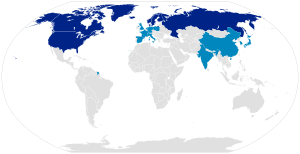Arctic Council
 members observers | |
| Formation | September 19, 1996 (Ottawa Declaration) |
|---|---|
| Type | Governmental organization |
| Purpose | Forum for promoting cooperation, coordination, and interaction among the Arctic states, with the involvement of the Arctic Indigenous communities |
| Headquarters | Tromsø, Norway (since 2012) |
Membership | |
Main organ | Secretariat |
| Website | arctic-council.org |
The Arctic Council is a high-level forum between governments. It addresses issues faced by the Arctic governments and the indigenous people of the Arctic. The Council is formed of eight countries: Canada, Denmark, Finland, Iceland, Norway, Russia, Sweden, and the United States.[1] All of these countries have sovereignty over the lands within the Arctic Circle. There are also some observer states.
The Council was formed in 1996 by the Ottawa Declaration.[2] It is designed to encourage cooperation, coordination, and interaction among the Arctic states. The Council meets every six months for a Senior Arctic Officials (SAO) meeting. Senior Arctic Officials are representatives of the member states. Every two years a Ministerial Meeting is held. A "Declaration" is produced at this meeting. It sums up the past work of the Council and its future plans.
Membership
[change | change source]The Council is made up of member and observer states, as well as Indigenous "permanent participants" and observer organizations.[3]
States
[change | change source]Member states
[change | change source]To be a member, a state must have territory in the Arctic. The member states are:
- Canada
- Denmark; representing Greenland
- Finland
- Iceland
- Norway
- Russia
- Sweden
- United States
Observer states
[change | change source]Observer status is open to non-Arctic states. They must be approved by the Council at the Ministerial Meetings. Observers have no voting rights in the Council. Currently, thirteen non-Arctic states have observer status.[4]
Current observer states are (2019):
- Germany, 1998
- Netherlands, 1998
- Poland, 1998
- United Kingdom, 1998
- France, 2000
- Spain, 2006
- China, 2013
- India, 2013
- Italy, 2013
- Japan, 2013
- South Korea, 2013
- Singapore, 2013
- Switzerland, 2017
References
[change | change source]- ↑ "About the Arctic Council". Arctic Council. Retrieved 2021-04-14.
- ↑ Council, Arctic (1996). "Ottawa Declaration (1996)". Arctic Council.
- ↑ "About the Arctic Council". The Arctic Council. April 7, 2011. Archived from the original on September 27, 2013. Retrieved Sep 6, 2013.
- ↑ Category: Observers (2011-04-27). "Six non-arctic countries have been admitted as observers to the Arctic Council". Arctic-council.org. Archived from the original on 2013-10-20. Retrieved 2013-09-24.
Other websites
[change | change source]- www.arctic-council.org – Arctic Council
- Arctic nations meet as tensions and temperatures run high (2021) Bangkok Post
